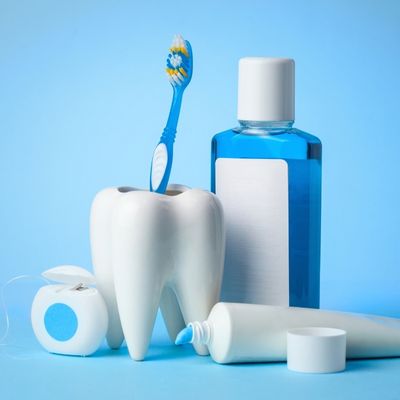What You Should Know About Fluoride
 |
Fluoride is beneficial to teeth and bones as it helps:
- remineralize your tooth enamel, which can prevent cavities and reverse early signs of tooth decay.
- inhibit bacterial growth and bacterial acid production in the mouth.
- slow down the loss of minerals from tooth enamel
- and prevent bone fractures.
Did you know that there are two forms of Fluorides: Topical and Systemic?
Topical Fluorides are found in toothpaste, mouth rinses, and gels. Topical fluorides strengthen teeth already present in the mouth, making them more decay-resistant.
Systemic Fluorides are those that are ingested. They come in the form of tablets or lozenges and are incorporated into tooth structures that are forming in children. Systemic fluorides also provide topical protection because fluoride is present in saliva, which continually bathes the teeth.
The Importance of Fluoride
Fluoride plays an important role in dental and bone health. A deficiency of fluoride can lead to dental caries and potentially bone problems. The main signs of fluoride deficiency are cavities and weak bones and that's because a lack of fluoride can cause your enamel to become weak and prone to decay.
There are some natural ways one should follow to maintain the fluoride intake in order to prevent cavities:
- Make sure to consume fluoridated water, which is added to the drinking water supply of most communities across Canada (you can find out if your tap water source is fluoridated by calling your local water district). Most bottled water does not contain fluoride.
- Brushing regularly with fluoridated toothpaste. (Look for a toothpaste that contains at least 1250 ppm or parts per million, of fluoride).
- Mouthwash can be a good source of fluoride. (Make sure to read the description of your chosen mouthwash brand).
- Some drinks are high in fluoride, such as black tea, wine, green tea, coffee, tap water, and juice.
- Foods such as spinach, grapes, raisins, potatoes, oatmeal, and canned shellfish like shrimp and blue crab.
- Certain fluoride supplements are available at pharmacies with a prescription from your doctor or dentist.
- For people with a history of cavities, a dentist can apply fluoride directly to your teeth in the form of a gel, foam, or varnish which is called a dental fluoride application.
The maximum reduction in tooth decay is achieved when fluoride is available both topically and systemically. Water fluoridation provides both types of exposure. However, also note that exposure to too much fluoride can lead to dental fluorosis and skeletal fluorosis which can damage bones and joints. New research reinforces the many benefits of fluoride.
Not sure about the appropriate amount of fluoride for you and your family? Contact our dental office today and we'd be happy to answer your questions.


